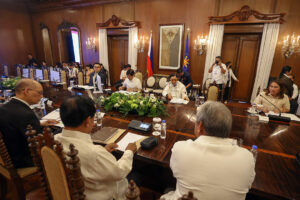By Luisa Maria Jacinta C. Jocson, Reporter
THE PHILIPPINE government’s budget deficit shrank in October as revenue growth outpaced spending, the Bureau of the Treasury (BTr) said, easing the pressure to borrow to pay for its debt.
The fiscal gap narrowed by 65.27% to P34.4 billion from P99.1 billion a year ago, the Treasury said in its cash operations report.
“This was underscored by a notable 33.56% rise in revenue collections outpacing government expenditure growth of 8.32%,” it said. Government revenues rose to P385.8 billion from P288.9 billion a year earlier.
Tax revenues rose by more than a third to P354.7 billion, driven by a 46.94% surge in Bureau of Internal Revenue (BIR) collections to P274.4 billion and a 3.83% increase in Bureau of Customs (BoC) revenue to P77.9 billion.
The Treasury bureau attributed the BIR’s revenue growth to the remittance of third-quarter value-added tax returns, which became due on Oct. 25.
“The jump in revenues more than offset the increase in expenditures,” China Banking Corp. Chief Economist Domini S. Velasquez said in a Viber message. “We have seen this trend in the previous months, and we will likely end the year not breaching the government’s deficit target.”
Nontax revenues went up by more than a fifth to P31.1 billion, as Treasury income climbed by more than a quarter to P16.8 billion.
“The favorable outcome for the period was primarily bolstered by the increased earnings on National Government (NG) deposits, BTr’s managed funds and the NG’s share from the Philippine Amusement and Gaming Corp. (PAGCOR) income,” the Treasury said.
Revenue from other offices, privatization proceeds and fees and charges rose by 17.25% to P14.3 billion.
Meanwhile, state spending went up by 8.32% to P420.2 billion from a year earlier.
Spending by the Public Works, Defense and Transportation departments boosted overall expenditures, the Treasury bureau said.
It also said larger interest payments, as well as maintenance and other operating expenses, particularly spending on village and youth council elections contributed to overall expenditures.
“However, the growth of disbursements was weighed down by the lower national tax allotment shares of local government units and the timing of subsidy releases to government corporations,” it added.
Spending net of interest payments inched up by 1.83% to P361.2 billion, while interest payments ballooned by 77.74% to P59 billion.
In the 10 months to October, the budget gap narrowed by 8.45% to P1.018 trillion from a year earlier. This was equivalent to 67.88% of the full-year P1.499-trillion deficit program.
Revenues increased by 9.41% to P3.224 trillion, which was already 86% of the target for the year.
Tax revenues, which accounted for 89.84% of total collection, went up by 9.18% to P2.896 trillion.
BIR revenue rose by 11.11% to 2.133 trillion, while Customs collections were 3.47% higher at P738.3 billion.
Meanwhile, nontax revenues rose by 11.5% to P327.6 billion as BTr income jumped by 22.31% to P174.8 billion.
“The BTr’s year-to-date income already exceeded the P58.3 billion full-year program by almost threefold. The higher year-to-date collection was driven mainly by dividend remittances, interest income from BTr’s managed funds, NG share from PAGCOR and Manila International Airport Authority profit, as well as government service income,” it added.
Revenues from other offices inched higher by 1.25% to P152.8 billion.
Economic reopening also led to more business activities that helped boost tax collections, Michael L. Ricafort, chief economist at Rizal Commercial Banking Corp., said in a Viber message.
Meanwhile, government expenditures rose by 4.52% to P4.242 trillion in the 10 months to October from year ago. The amount was already 81.12% of this year’s spending plan.
Spending net of interest payments went up by 2.69% to P3.722 trillion, while interest payments climbed by 19.84% to P519.1 billion.
Ms. Velasquez said there is still a need to reform the tax system amid low revenue and tax effort ratios.
“New taxes and higher tax rates, as well as intensified tax collections under existing tax laws would further improve fiscal performance in terms of narrower budget deficits, reduced borrowings and slower increment in overall debt,” Mr. Ricafort said.
The National Government’s revenue effort declined to 16.47% at the end of the third quarter from 17.06% a year ago, while the tax effort dropped to 14.57% from 15.34%.
The revenue and tax efforts refer to the share of revenue and tax collections, respectively, in the gross domestic product (GDP).
The government’s deficit-to-GDP ratio was at 5.71% at the end of September. This year, the government has set a budget deficit ceiling of P1.499 trillion, equivalent to 6.1% of GDP.
